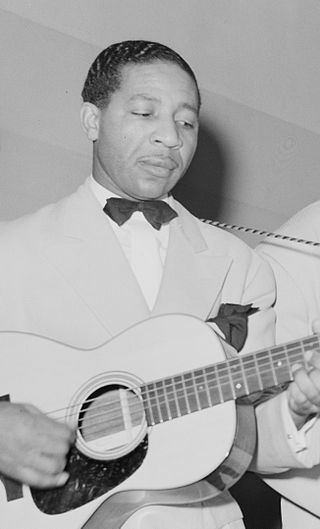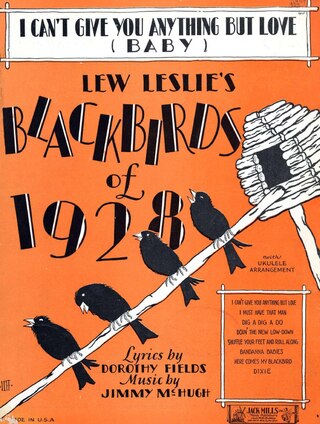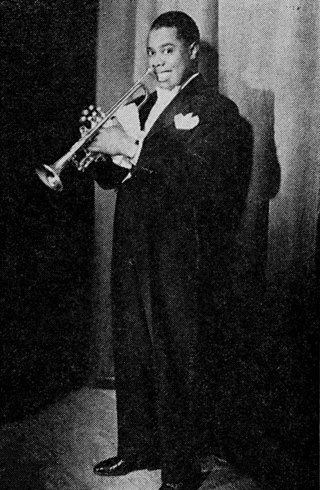Related Research Articles

Louis Daniel Armstrong, nicknamed "Satchmo", "Satch", and "Pops", was an American trumpeter and vocalist. He was among the most influential figures in jazz. His career spanned five decades and several eras in the history of jazz. Armstrong received numerous accolades including the Grammy Award for Best Male Vocal Performance for Hello, Dolly! in 1965, as well as a posthumous win for the Grammy Lifetime Achievement Award in 1972. His influence crossed musical genres, with inductions into the DownBeat Jazz Hall of Fame, the Rock and Roll Hall of Fame, and the National Rhythm & Blues Hall of Fame, among others.

Clarence Williams was an American jazz pianist, composer, promoter, vocalist, theatrical producer, and publisher.

This is a list of notable events in music that took place in the year 1928.
Swing music is a style of jazz that developed in the United States during the late 1920s and early 1930s. It became nationally popular from the mid-1930s. Swing bands usually featured soloists who would improvise on the melody over the arrangement. The danceable swing style of big bands and bandleaders such as Benny Goodman was the dominant form of American popular music from 1935 to 1946, known as the swing era, when people were dancing the Lindy Hop. The verb "to swing" is also used as a term of praise for playing that has a strong groove or drive. Musicians of the swing era include Duke Ellington, Benny Goodman, Count Basie, Cab Calloway, Benny Carter, Jimmy Dorsey, Tommy Dorsey, Woody Herman, Earl Hines, Bunny Berigan, Harry James, Lionel Hampton, Glenn Miller, Artie Shaw, Jimmie Lunceford, and Django Reinhardt.

Ernest Loring "Red" Nichols was an American jazz cornetist, composer, and jazz bandleader. He was one of the most prolific and influential jazz musicians in the late 1920s and early 1930s, appearing on over 4,000 recordings. In 1959, a biopic was made of his life and career, The Five Pennies, starring Danny Kaye.

The Jazz Age was a period in the 1920s and 1930s in which jazz music and dance styles gained worldwide popularity. The Jazz Age's cultural repercussions were primarily felt in the United States, the birthplace of jazz. Originating in New Orleans as mainly sourced from the culture of African Americans, jazz played a significant part in wider cultural changes in this period, and its influence on popular culture continued long afterwards.
Lillian Hardin Armstrong was an American jazz pianist, composer, arranger, singer, and bandleader. She was the second wife of Louis Armstrong, with whom she collaborated on many recordings in the 1920s.

Gaetano Alberto "Guy" Lombardo was a Canadian and American bandleader, violinist, and hydroplane racer whose unique "sweet jazz" style remained popular with audiences for nearly five decades.

OKeh Records is an American record label founded by the Otto Heinemann Phonograph Corporation, a phonograph supplier established in 1916, which branched out into phonograph records in 1918. The name was spelled "OkeH" from the initials of Otto K. E. Heinemann but later changed to "OKeh". In 1965, OKeh became a subsidiary of Epic Records, a subsidiary of Sony Music. OKeh has since become a jazz imprint, distributed by Sony Masterworks.
The Hot Five was Louis Armstrong's first jazz recording band led under his own name.

Alonzo "Lonnie" Johnson was an American blues and jazz singer, guitarist, violinist and songwriter. He was a pioneer of jazz guitar and jazz violin and is recognized as the first to play an electrically amplified violin.

Sippie Wallace was an American blues singer, pianist and songwriter. Her early career in tent shows gained her the billing "The Texas Nightingale". Between 1923 and 1927, she recorded over 40 songs for Okeh Records, many written by her or her brothers, George and Hersal Thomas. Her accompanists included Louis Armstrong, Johnny Dodds, Sidney Bechet, King Oliver, and Clarence Williams. Among the top female blues vocalists of her era, Wallace ranked with Ma Rainey, Ida Cox, Alberta Hunter, and Bessie Smith.

"Sweet Georgia Brown" is a jazz standard composed in 1925 by Ben Bernie and Maceo Pinkard, with lyrics by Kenneth Casey.

Carmen Mercedes McRae was an American jazz singer. She is considered one of the most influential jazz vocalists of the 20th century and is remembered for her behind-the-beat phrasing and ironic interpretation of lyrics.

"I Can't Give You Anything but Love, Baby" is an American popular song and jazz standard by Jimmy McHugh (music) and Dorothy Fields (lyrics). The song was introduced by Adelaide Hall at Les Ambassadeurs Club in New York in January 1928 in Lew Leslie's Blackbird Revue, which opened on Broadway later that year as the highly successful Blackbirds of 1928, wherein it was performed by Adelaide Hall, Aida Ward, and Willard McLean.

Theodore Dudley "Red" Saunders was an American jazz drummer and bandleader. He also played vibraphone and timpani.
Women in jazz have contributed throughout the many eras of jazz history, both as performers and as composers, songwriters and bandleaders. While women such as Billie Holiday and Ella Fitzgerald were famous for their jazz singing, women have achieved much less recognition for their contributions as composers, bandleaders and instrumental performers. Other notable jazz women include piano player Lil Hardin Armstrong and jazz songwriters Irene Higginbotham and Dorothy Fields.

The Louis Armstrong Hot Five and Hot Seven Sessions were recorded between 1925 and 1928 by Louis Armstrong with his Hot Five and Hot Seven groups. According to the National Recording Registry, "Louis Armstrong was jazz's first great soloist and is among American music's most important and influential figures. These sessions, his solos in particular, set a standard musicians still strive to equal in their beauty and innovation." These recordings were added to the National Recording Registry in 2002, the first year of the institution's existence.

The Smithsonian Collection of Classic Jazz is a six-LP box set released in 1973 by the Smithsonian Institution. Compiled by jazz critic, scholar, and historian Martin Williams, the album included tracks from over a dozen record labels spanning several decades and genres of American jazz, from ragtime and big band to post-bop and free jazz.
Hociel Thomas was an American blues singer and pianist in the classic female blues style.
References
- 1 2 3 Lillie Delk Christian : Biography; All Music online; retrieved September 2023
- 1 2 3 4 The Lillie Delk Christian Mysteries : People Seemed to Like it; A Visit to Mrs. [Lillie Delk] Christian in Chicago, April 25, 1961; Wordpress.com; retrieved September 8, 2023; features edited transcript of a 64-minute interview with Mrs. Delk Christian.